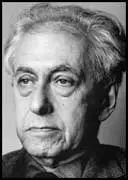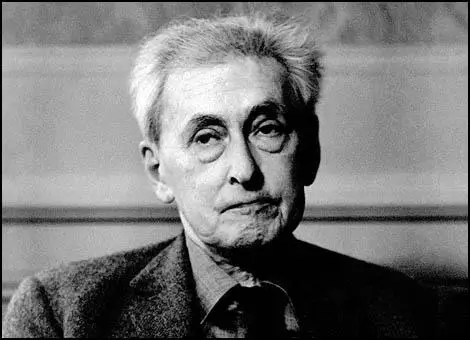Ilya Ehrenburg

Ilya Ehrenburg was born in Russia on 27th January 1891. As a young man he became a follower of Lenin. He went into exile where he became a poet. After the successful Bolshevik Revolution in 1917, Ehrenburg returned to Russia.
Ehrenburg was a member of the Jewish Anti-Fascist Committee. He also worked for Izvestia and between 1936 and 1939 reported on the Spanish Civil War. As well as writing for the newspaper he also collected information on the Popular Front government for the NKVD.
After the war he edited The Black Book that was made up accounts by Jewish survivors of the Holocaust in the Soviet Union and Poland.
Ilya Ehrenburg died of prostate and bladder cancer on 31st August 1967 and was interred in Novodevichy Cemetery in Moscow. The gravestone includes a reproduction of his portrait drawn by his friend Pablo Picasso.

Primary Sources
(1) Ilya Ehrenburg, letter sent to Marcel Rosenberg, Soviet ambassador to the Spanish Republic (17th September, 1936)
To add to today's telephone conversation, I report: Companys was in a very nervous state. I spoke with him for more than two hours, while all he did the whole time was complain about Madrid. His arguments: the new government has not changed anything; slights Catalonia as if it were a province and this is an autonomous republic; sends instructions like to the other governors - refuses to turn over religious schools to the generalitat; demands soldiers and does not give out any of the weapons bought abroad, not one airplane and so on.
As yet, neither Caballero nor Prieto has managed to find time to receive him. And so on. He explained that if they did not receive cotton or hard currency for cotton within three weeks there would be a hundred thousand out of work. He very much wanted to trade with the Soviet Union. He believed that any sign of attention being paid to Catalonia by the Soviet Union was important. As for the internal situation, he spoke rather optimistically; the influence of the FAl was decreasing, the role of the government growing.
I spoke with Garcia Oliver. He was also in a frenzied state. Intransigent. At the same time that Lopez, the leader of the Madrid syndicalists, was declaring to me that they had not permitted and would not permit attacks on the Soviet Union in the CNT newspaper, Oliver declared that they had said that they were "criticizing" the Soviet Union because it was not an ally, since it had signed the non-interference pact, and so on. Durruti, who has been at the front, has learned a lot, whereas Oliver, in Barcelona, is still nine-tenths anarchist ravings. For instance, he is against a unified command on the Aragon front; a unified command is necessary only when a general offensive begins. Sandino, who was present during this part of the conversation, spoke out for a unified command. They touched on the question of mobilization and the transformation of the militia into an army. Durruti made much of the mobilization plans (I do not know why - there are volunteers but no guns). Oliver said that he agreed with Durruti, since "Communists and Socialists are hiding themselves in the rear and pushing the FAI-ists out of the cities and villages." At this point he was almost raving. I would not have been surprised if he had shot me.
I spoke with Trueba, the PSUC (Communist) political commissar. He complained about the FAI-ists. They are not giving our men ammunition. We have only thirty-six bullets left per man. The anarchists have reserves of a million and a half. Colonel Villalba's soldiers only have a hundred cartridges each. He cited many instances of the petty tyrannies of FAI. People from the CNT complained to me that Fronsosa, the leader of PSUC, gave a speech at a demonstration in San Boi in which he said that the Catalans should not be given even one gun, since the guns would just fall into the hands of the anarchists. In general, during the ten days that I was in Catalonia, relations between Madrid and the generalitat on the one hand, and that between the Communists and the anarchists on the other, became very much more strained. Companys is wavering; either he gravitates toward the anarchists, who have agreed to recognize the national and even nationalistic demands of the Esquerra, or he depends on the PSUC in the struggle against FAI. His circle is divided between supporters of the former and of the latter solutions. If the situation on the Talavera front worsens, we can expect him to come out on one or the other side. We must improve relations between the PSUC and the CNT and then try to get closer to Companys.
In Valencia our party is working well, and the influence of the UGT is growing. But the CNT has free rein there. The governor takes their side completely. This is what happened when I was there: sixty anarchists with two machine-guns turned up from the front, as their commander had been killed. In Valencia they burned the archives and then wanted to break into the prison to free the criminals. The censor (this is under Lopez, the leader of the CNT) prohibited our newspaper from reporting about any of this outrage, and in the CNT paper there was a note that the "free masses destroyed the law archives as part of the accursed past."
(2) Ilya Ehrenburg, letter sent to Marcel Rosenberg, Soviet ambassador to the Spanish Republic (18th September, 1936)
Today I again had a long conversation with Companys. He proposed to form a local government in this way: half Esquerra, half CNT and UGT. He said that he would reserve for himself finance and the police. After my words on the fact that the anarchists' lack of personal responsibility would interfere with manufacturing, he declared that he "agreed" to put a Marxist at the head of industry. He called Oliver a fanatic. He reproached the PSUC for not answering the terror of the anarchists with the same. On the conduct of the Catalan militia in Madrid, he said that that was the FAI-ists and that the national Guardia and the Esquerrists would fight anyone. He said that Madrid itself wanted the CNT militia, while not hiding the fact that the latter left to "establish order in Madrid." He advised sending them back from Madrid.
The whole time he cursed the FAI. He knew that I was going from him to the CNT and was very interested in how the FAI-ists would converse with me. He requested that I communicate the results of the conversation with him. He complained that the FAI-ists were against Russia were carrying out anti-Soviet propaganda, or more accurately, carried out but that he was our friend, and so on. A steamship, even if it held only sugar would soften his heart.
(3) Ilya Ehrenburg, letter sent to Marcel Rosenberg, Soviet ambassador to the Spanish Republic(30th September, 1936)
Undoubtedly one of the main tasks is to attract to the revolution's side, at this stage, the healthier elements from among the anarchists. It is characteristic that in the last conversation that I had with Galarza, the minister of the interior (a Socialist), he mentioned that his attempt at cooperation with the anarchist labor federation had produced positive results, and that lately several of the confederation leaders had begun to recognize that many alien elements were interspersed among their members. One of the anarchists' "idols," who provokes great doubts of a nonideological sort, is Juan Lopez, who is now the boss of Valencia.
The question of possibly merging the Socialists and the Communists into one party (as in Catalonia) does not have, according to my preliminary impression, any immediate, current significance since the Socialist party, as such, at least in the central region, does not make itself much felt and since the Socialists and Communists act in concert within the framework of a union organization - the General Workers' Union - headed by Caballero (abbreviated UGT), the activity and influence of which far exceed the limits of a union.
Except for La Pasionaria, the leadership of the Communist party consists of people who do not yet have authority on the national level. The party's real general secretary was an individual about whom I wrote you. Because he occupied just such a position not only within the Central Committee but also outside it, he besmirched the reputations of two institutions with all the people in the Popular Front. However we evaluate his role, in any case, the fact that he himself took the place of the leadership hindered the formation, from the leadership cadres, of independent political leaders.
The Communist party, which has attracted some of the more politically conscious elements of the working class, is, all the same, insufficiently organized and politically strong to take on even to the slightest degree the political work for the armed forces of the revolution. In Catalonia, about which I can judge only through partial evidence, the party is significantly weaker and undoubtedly suffers from the provocative activities of Trotskyists, who have won over several active leaders, like, for example, Maurin. Undoubtedly the party is still incapable of independently rousing the masses to some kind of large-scale action, or of concentrating all the strength of the leadership on such an action. What is more the example of Alcazar has been in this connection a notoriously negative test for the party. However, I will not give a more definite evaluation of the cadres and strength of the party, since this is the only organization with which I have had insufficient contact.
What are our channels for action in this situation? We support close contact with the majority of the members of the government, chiefly with Caballero and Prieto. Both of them, through their personal and public authority, stand incomparably higher than the other members of the government and play a leading role for them. Both of them very attentively listen to everything that we say. Prieto at this particular time is trying at all costs to avoid conflict with Caballero and therefore is trying not to focus on the issues.
I think it unnecessary to dwell at this time on the problem of how an aggravation in class contradictions might take shape during a protracted civil war and the difficulties with the economy that might result (supplying the army, the workers, and so on), especially as I think it futile to explore a more distant prospect while the situation at the front still places all the issues of the revolution under a question mark.
In this kind of circumstance, such as I have touched on above and which I went into in my summary telegram, there is no need to prove that supplying the Spanish with technology may turn out to have a huge influence on the final outcome of the civil war. It is clear that however significant the temporary successes of the rebels may be, they have in no way guaranteed a definitive advantage. The steadfast military cadres of the revolution will be forged in the very process of the civil war.
(4) Ilya Ehrenburg, Izvestia, on the May Riots (3rd November, 1937)
I must express the sense of shame which I now feel as a man. The same day that the fascists are busy shooting the women of Asturias, there appeared in the French paper a protest against injustice. But these people did not protest against the butchers of Asturias but rather against the republic who dares to detain fascists and provocateurs of the POUM.

